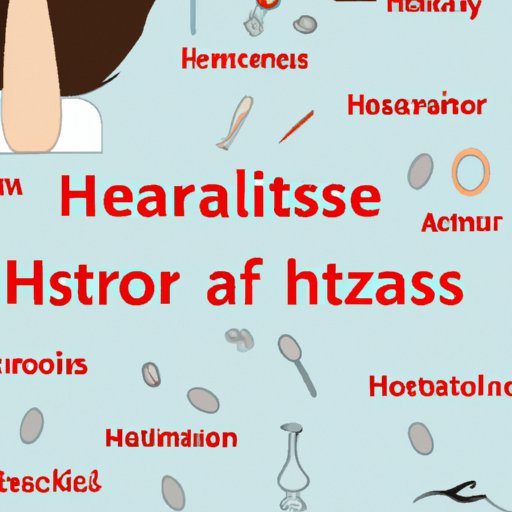Introduction
Hair loss is a condition that affects millions of people around the world. It can be caused by a variety of factors, including hormonal imbalances, stress, poor diet, medications, heredity, autoimmune disorders, and age. In this article, we will explore the most common causes of hair loss and provide tips for preventing it.
Hormonal Imbalance
Hormones play a key role in regulating hair growth. When there is an imbalance in the body’s hormones, hair loss can occur. Common hormonal imbalances that can cause hair loss include thyroid issues, polycystic ovary syndrome (PCOS), and menopause. If you suspect that a hormonal imbalance is causing your hair loss, it is important to speak to your doctor about treatment options.
Stress
Stress is one of the most common causes of hair loss. Stress can cause the body to produce higher levels of the hormone cortisol, which can lead to hair loss. Common sources of stress that can lead to hair loss include physical or emotional trauma, job loss, financial worries, and family problems. To minimize the effects of stress on your hair, it is important to practice stress-relieving activities like yoga and meditation.
Poor Diet
A poor diet can also lead to hair loss. Nutritional deficiencies, such as a lack of iron, zinc, and vitamin B12, can cause hair to thin and fall out. To prevent hair loss due to nutritional deficiencies, make sure to eat a balanced diet that includes plenty of fruits, vegetables, lean proteins, and healthy fats. Additionally, taking supplements of vitamins and minerals can help ensure your body is getting the nutrients it needs to keep your hair healthy.
Medications
Certain medications can also cause hair loss. Common culprits are chemotherapies, blood pressure medications, and birth control pills. If you are taking any medications and experiencing hair loss, talk to your doctor about alternative treatments or medications that may be less likely to cause hair loss. Additionally, make sure to follow your doctor’s instructions for minimizing the side effects of your medications.
Heredity
Hair loss can also be caused by genetics. Hereditary hair loss, known as androgenic alopecia, is the most common type of hair loss. It usually occurs in a patterned way, with the hairline receding from the forehead and thinning at the crown. If you suspect that your hair loss is hereditary, it is important to speak to your doctor to rule out any other potential causes.
Autoimmune Disorders
Autoimmune disorders, such as lupus and alopecia areata, can also cause hair loss. These conditions cause the immune system to attack the hair follicles, leading to hair loss. Treatment for autoimmune-related hair loss typically involves medications that suppress the immune system. Additionally, there are lifestyle changes that can help minimize the effects of these conditions on hair growth.
Age
As we age, our hair naturally becomes thinner and more prone to breakage. However, certain strategies can help minimize the effects of aging on hair loss. For example, avoiding heat styling tools, using gentle shampoos and conditioners, and eating a balanced diet can help keep your hair healthy as you age.
Conclusion
Hair loss can be caused by a variety of factors, including hormonal imbalances, stress, poor diet, medications, heredity, autoimmune disorders, and age. To prevent hair loss, it is important to address any underlying conditions and make lifestyle changes that promote healthy hair growth. Additionally, speaking to your doctor about treatment options can help you find the best solution for preventing hair loss.


